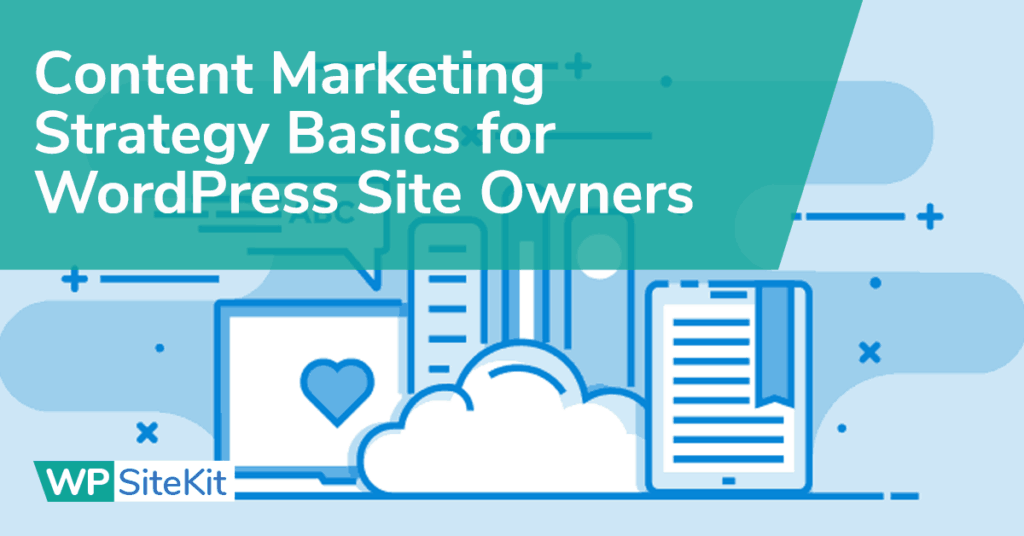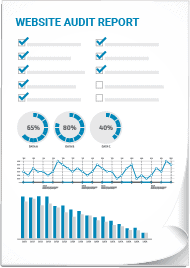It should come as no surprise, that WordPress is a fantastic CMS (content management system) to use for content creation.
After all, WordPress now powers over 30% of all websites.
But even with the best of intentions and an intuitive platform like WordPress, you still won’t get far without a well-thought out strategy.
Here’s why.
Why Use a Content Marketing Strategy?
Most business owners know that planning is critical to success. Diving in without a well-documented strategy is often a recipe for wasted time and energy.
It’s no different when it comes to content marketing. Focusing efforts where they’re needed most will ensure that your campaigns have a high impact from the get go.
It’s particularly easy to get overwhelmed when it comes to picking the right keywords, keeping your content focused, and meeting deadlines.
But the benefits of employing content marketing are substantial.
As PPC (pay per click) opportunities have become increasingly expensive, organic traffic looks more and more appealing. You’ll often hear organic traffic being referred to as a “gift that keeps giving.”
SEO-optimized content can earn traffic for months and years to come without requiring the ongoing pay-to-play nature of PPC advertising.
The truth is, a lot goes into a good content plan. So let’s break down where you should start.
What Makes a Good Content Strategy?
There’s a lot of ground to cover here, so we’ll separate out the individual components below. But here’s a brief outline in case you’re looking for help with any specific topic.
- Keyword research
- On-Page SEO
- Effective CTAs
- Publishing consistency
Now, for some specifics.
Do Your Keyword Research
You’ve likely heard plenty about keyword research over the years. How it’s both crucial to building online traffic, and how it’s half art, half science.
At the most fundamental level, your goal is to ascertain what your customers or clients are typing into search engines at various points of their buyer journeys.
If you’re selling tickets to a local fair for example, you’ll likely want to examine keywords like “Things to do in [town name]” or “[Town name] town fair.” But you can get much more insightful than this.
A good way to figure out where to start, is to look at your own Google Search Console data and see what keywords your pages are almost ranking for. Those will often be low-hanging fruit since your page content is likely already semantically relevant to the query.
You can also use Google’s Keyword Planner tool, or a third party tool like SEMRush or Ahrefs. When you’re researching keywords, be sure to look for terms that are low to mid competition, but still have decent search volume.
There’s no exact science to this, so you’ll need to make some judgment calls. Some keywords will be low volume, but imply a very strong buyer intent. For example, “buy wooden iphone case” may not get many searches, but you can bet that when someone types that into Google, they’re looking to make a purchase.
Follow On-Page SEO Best Practices
So you’ve found the right keywords to target with your content. Now, what do you do with that information?
The jargon used is far more complicated and intimidating than the actual process or skills required. So don’t get deterred and bear with us.
The key takeaway is to use keywords where they’re appropriate and relevant.
Don’t go overboard, and don’t just cram keywords into your content where they don’t belong.
Start with the basics, and make sure that the title of your content includes the most important keyword phrase you’re trying to target.
Next, as you write your copy, be sure to include your keyword from time to time. There’s no magic number here, but 4-8 times in a ~1000 word article should give you a smart goal-post to aim for.
You’ll also want to include the keyword in image alt-tags, in the URL itself, and in the meta description and H2 (subheading) tags.
Finally, the word-count of your content can have an indirect effect on rankings, and thus the effectiveness of your WordPress content strategy. This doesn’t mean go overboard mind you!
But if the topic you’re covering is in-depth, try to write 1,000 – 1,500 words. If you’re goal is to answer short questions searchers might have, shorter content will do the trick.
Similarly, if you’re writing about a very niche subject, and there’s not a lot of competition, you may be able to get away with writing content that’s only 600 – 800 words long.
Note that if answering short questions is central to your content marketing approach, you might want to think twice. With the rapid proliferation of featured snippets, the ability for this type of content to generate clicks is quickly diminishing (see study here).
Bonus: After you’ve built up a decent catalogue of content, go back through your copy and include some internal links to your other articles. This is a great way to give them a boost and encourage engagement on your site.
Establish a Purpose for Your Content
When you’re creating content, one of the most important things to keep in mind is that every article should have a clearly defined purpose.
This will help you stay on message, provide more value, and steer readers in the direction you want them to go. The more you ramble, the less likely you are to get results.
When you’re developing content, make sure you know what you want a reader to do. Then try to drive them to take action towards that ultimate goal.
A few common content objectives are
- Collect reader’s email addresses
- Convince a reader to make a purchase
- Drive traffic to a product page
Whatever you do, make sure that your content can provide tangible value on its own. You’ll earn more genuine fans that way, and you’re also far more likely to get shares and true engagement.
Publish Content Regularly
The last thing you’ll want to plan for when building out your content marketing strategy, is how often you want to publish content.
Be reasonable here, as consistency is considered more important than frequency.
Meaning, if you can manage publishing 1 article every week, that’s great if you’re able to maintain the commitment. If that stretches you too thin, it’d be better to set a more modest goal that you’re confident you can reach month over month.
Before you publish even your first article, it’d be wise to have 2-3 months worth of content ready to go. This will help you stay ahead of schedule, and never scrambling to meet deadlines.
You might be wondering why this matters…
First and foremost, you’ll save yourself a lot of headaches by being ahead of schedule. Call me crazy but I don’t love working under the gun.
Secondly, as timelines get crunched, quality usually drops. Nobody wants that.
Last but not least, Google actually places value on how often websites update their content. Frequently referred to as “content freshness”, this is an oft-overlooked component of a good SEO strategy.
Putting It All Together
We covered a lot of ground today, and it may seem like you’ve got quite the marching order.
But truthfully, if you take the time to build a content marketing strategy at all, you’ll be ahead of the game.
Hopefully after reading the tips mentioned above, you’re ready to start building and executing off your own content strategy.
Of course, sometimes time is just too scarce to properly invest in valuable marketing channels like content. If that’s the position you find yourself in, don’t worry. We can help!
We offer WordPress website building and content writing services to our customers.




